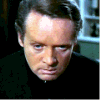Ozu is known for quiet films, where great emotion lingers just below the surface of Japanese politeness and pleasantries. Tokyo Twilight starts out in this vein, but the problems here are too big to stay hidden for long. The story centers on a banker Shukichi and his two daughters. The eldest daughter Takako has fled home from an abusive husband with her infant daughter. Meanwhile, the youngest, Akiko, is spending all of her time in mahjong parlors, while claiming to be studying English shorthand. (I'm very curious why this would be a topic of study, but can't find much information on the subject.) It turns out that the new owner of one of these mahjong parlors is the women's mother, who abandoned the family years ago.
Takako and Shukichi are played by Ozu veterans Setsuko Hara and Chishu Ryu. Ozu re-used the same cast members more frequently than Wes Anderson (who also shares a similar set design and choreographic aesthetic), and the biggest challenge of being an Ozu fan is in telling the different characters apart. It doesn't help, for example, that Hara plays a woman named Noriko in three consecutive films. Hara, one of the most beloved actresses of her era, is quite good in the film, but she mostly stays out of the spotlight.
It's the role of Akiko, played by the lesser-known Ineko Arima, that eventually steals the show. At first, her dead expression makes her appear to be just another disaffected adolescent, making the movie appear at first glance to be a Japanese take on Rebel Without a Cause (released just two years earlier), with pinball and street racing replaced with mahjong and pachinko. But she's hiding a shameful secret, and her self-hatred boils into some extremely intense scenes that go strongly against the Ozu stereotype.
Unfortunately, the overstated social message - in particular, an emphasis on the need for a two-parent family - probably keeps this from being a top-tier Ozu film. (I don't know enough about Ozu or Japanese society to know how important a message this was for him.) But it does have some wonderful scenes. My favorite character in this one is actually Shukichi, the father. The actor Chishu Ryu (who, astoundingly, appears in 52 out of 54 Ozu films), is famous for a mild, passive, demeanor that doesn't quite conceal the loss his characters feel. I can't think of a single American actor that compares - certainly, we have our share of stoic men, but usually there's some trace of violence in the impassivity.
The final scene is especially moving - Shukichi, having just faced a great tragedy, is preparing for another day at the office. Without any cause whatsoever, there's something optimistic about him. As he sets off, outlined against a bleak and wintry day, we are reminded, as we are constantly by Ozu, that the world always has simple pleasures for us if we're willing to look.
Friday, May 23, 2014
Subscribe to:
Post Comments (Atom)

No comments:
Post a Comment